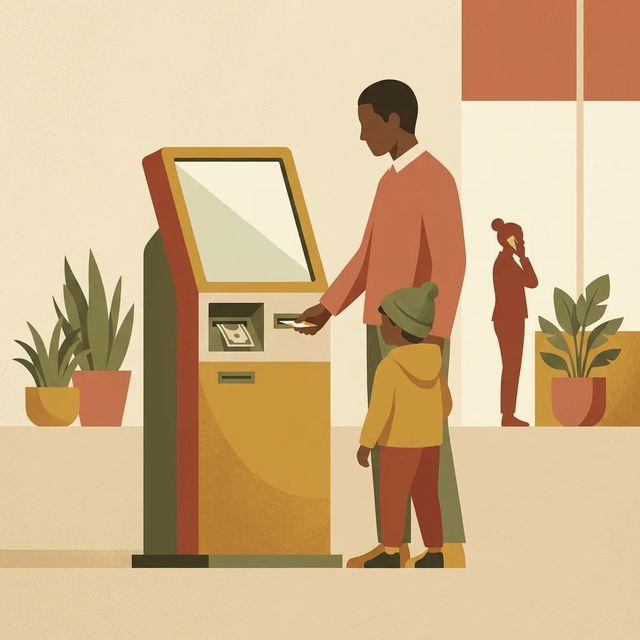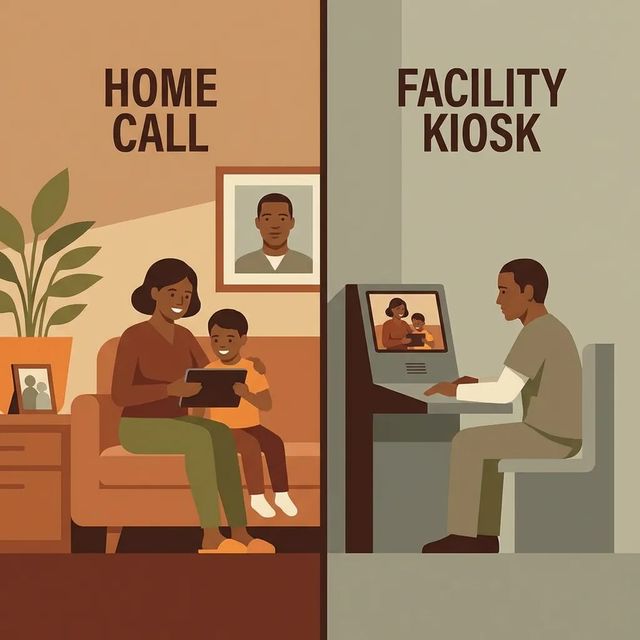Hancock County Justice Center, OH
Need to reach someone at Hancock County Justice Center? Look up an inmate, send messages or mail, add commissary funds, or schedule a visit.
Explore
Find an Inmate at Hancock County Justice Center, OH
Search for a loved one and send messages and photos in minutes.

Guides for This Facility

How to Add Money to an Inmate's Account at Hancock County Justice Center (TouchPay)
Adding money to a commissary account at Hancock County Justice Center is easy once you know your TouchPay options and have the right numbers ready.
Read Guide
Why Your Video Visit Might Be Denied at Hancock County Justice Center (and How to Prevent It)
Getting a video visit denied—or cut off mid-call—is frustrating, especially when you've planned your whole day around it. At Hancock County Justice Center, most denials come down to a handful of predictable issues. The good news? They're avoidable with some basic prep.
Read Guide
Your First Video Visit at Hancock County Justice Center: How to Create an Account, Schedule, and Prepare
Visits at Hancock County Justice Center are non-contact—you'll talk through a video monitor, whether you're in the lobby or connecting from home.
Read GuideAt a Glance
Visitation
- Visits are non-contact and conducted via video monitors; sessions are monitored and may be recorded.
- Video visitation hours are Monday through Sunday in three daily blocks: 9:00–11:20 AM, 12:20–4:20 PM, and 5:20–10:45 PM.
- All visits must be scheduled online at videovisitanywhere.com up to 21 days in advance and no less than 24 hours before the visit.
Communication
- Securus Technologies sets the cost for off‑site video visits; the Hancock County Justice Center does not set those rates.
- Enrollment requires a clear photograph of a valid photo ID showing the ID type, picture, full name, and date of birth.
- Video Visitation accounts are reviewed within 24 hours and applicants are emailed whether they are approved or disapproved.
Mail & Letters
- Mail must be addressed to Hancock County Justice Center, 200 West Crawford Street, with ATTN: inmate name.
- Letters must be in a plain envelope with a regular stamp and cannot include cash or money orders.
- Envelopes may contain only a letter and religious materials; other enclosed items will be removed and added to the inmate’s property.
Sending Commissary
- The facility has a TouchPay kiosk in the lobby for adding funds to inmate commissary accounts.
- The TouchPay kiosk accepts Visa/MasterCard, paper cash (bills only), and Green Dot MoneyPak.
- Kiosk deposits are available 24/7 and funds are typically available to the inmate within 24 hours.
Facility Info
- The facility's bed-rated capacity was set at 96 beds and expanded to 98 inmates in 2002.
- Corrections staff include a jail administrator, administrative manager, jail operations manager, jail sergeants, corrections officers, and clerks.
- Ohio correctional facilities operate under both state and local rules, with systemwide policy from ODRC and local managing-officer decisions.
Based on official sources and community feedback.Learn how we verify
Topic Overviews
Visitation
Hancock County Justice Center offers non-contact video visitation only. All sessions are monitored and may be recorded—you can't record visits yourself. Video visits are available daily in three blocks: 9:00–11:20 AM, 12:20–4:20 PM, and 5:20–10:45 PM. Book your appointment at videovisitanywhere.com up to 21 days in advance, but at least 24 hours before your visit. Visiting in the lobby? Arrive about 15 minutes early. You're limited to two 20-minute on-site visits per week. Cancel at least 24 hours ahead or you may be charged, and missed off-site visits aren't refunded. Dress standards apply, and visits can be denied for safety reasons or if there's a court no-contact order.
Read full guideCommunication
Hancock County Justice Center handles off-site video visitation through Securus Technologies. Securus sets pricing and payment terms—not the facility. To get approved for video visitation, submit a clear photo of a valid photo ID showing the ID type, your picture, your full name, and your date of birth. Accounts are reviewed within 24 hours, and you'll get an email letting you know if you're approved or denied. Having trouble with account setup, scheduling, or tech issues? The facility provides Securus customer support contact info. You'll also need a compatible device and a Securus account—follow Securus instructions for registration and payments.
Read full guideMail & Letters
Send mail to Hancock County Justice Center at 200 West Crawford Street, with "ATTN: the inmate's name" on the envelope. Use a plain envelope with a regular stamp—no cash or money orders allowed. Inside, include only a personal letter and religious materials. Anything else will be removed and placed in the inmate's property. Packages aren't automatically accepted. The inmate must request approval first, and only items on the facility's approved list are allowed (including specified white clothing items for males and females and a Bible). Unapproved packages get refused and returned. Drop off approved items only on Mondays 6–7 pm, Thursdays 6–7 pm, and Saturdays 8–9 am.
Read full guideSending Commissary
Hancock County Justice Center uses TouchPay for commissary and trust account deposits. The easiest in-person option is the TouchPay kiosk in the jail lobby—available 24/7. It accepts Visa/MasterCard, paper cash (bills only), and Green Dot MoneyPak. Deposits typically reach the inmate's account within 24 hours. You can also deposit by phone or online through TouchPay. You'll need to create a TouchPay account and provide the facility locator number (245840) plus the inmate's Subject Number. TouchPay charges a convenience fee for phone and online transactions—the fee is set by TouchPay, not the Sheriff's Office. Having issues? TouchPay offers depositor support by phone and email during their posted customer service hours.
Read full guideCommon Questions
Showing 6 of 15What are Hancock County Justice Center's video visitation hours?
Video visitation is available Monday through Sunday in three blocks: 9:00–11:20 AM, 12:20–4:20 PM, and 5:20–10:45 PM.
VisitationHow do I schedule a video visit at Hancock County Justice Center?
Schedule all video visits online at videovisitanywhere.com. You can book up to 21 days in advance, but no less than 24 hours before the visit.
VisitationWhat should I wear for a video visit at Hancock County Justice Center?
Follow the facility's dress standards. Men must wear undergarments and non-provocative clothing, with shorts no shorter than mid-thigh. Women must wear undergarments and avoid see-through, low-cut, revealing, or provocative clothing—additional limits apply to skirts and dresses.
VisitationWho sets the price for off‑site video visits at Hancock County Justice Center?
Securus Technologies sets the cost and payment rules for off-site video visits. Hancock County Justice Center does not set those rates.
CommunicationWhat ID do I need to submit to enroll for video visitation at Hancock County?
You must submit a clear photograph of a valid photo ID showing the ID type, your picture, your full name, and your date of birth. Make sure the image is clear so your identity can be verified.
CommunicationHow long will it take to find out if my video visitation account is approved?
Video visitation accounts are reviewed within 24 hours. The facility emails you to say whether you’re approved or disapproved.
CommunicationMore Guides
Ready to Connect?
Search for your loved one to start communicating today
Did You Know?
Send letters and packages to Hancock County Justice Center at 200 West Crawford Street. Write ATTN: inmate name on the envelope or parcel so staff can route it to the right person.
This guide is compiled from official facility documentation and community feedback. Learn how we verify
